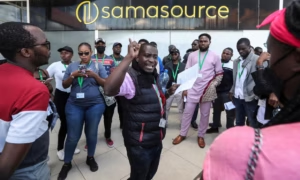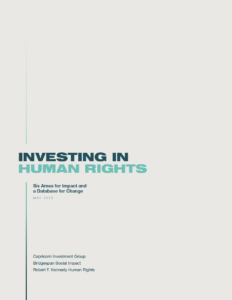Just a few years after the murder of George Floyd and a surge of corporate commitments to promoting equity, business leaders and politicians have slashed DEI roles in their companies, introduced anti-ESG and anti-DEI bills in local and state legislatures. This has been coupled with efforts to overturn affirmative action in universities and overturn grant programs designed to invest venture capital funding into Black women founders. This egregious corporate whiplash persists even while a majority of Americans say that focusing on DEIA is a good thing. Studies have also continued to show that higher percentages of BIPOC management are positively correlated with increased financial performance, meaning that investors are incentivized to advocate for corporate disclosure of quantitative DEIA data in their portfolio companies.
In the wake of this shifting discourse around business initiatives aimed at ensuring diversity and equity, the Robert F. Kennedy Human Rights Business & Human Rights department convened a wide group of stakeholders on March 27, 2024 to discuss the actionable steps they take to advance DEIA—and the opportunities it presents them, from financial return to a tool for risk management. Alongside Robert F. Kennedy Human Rights, speakers included Jazmin Carr of the Fearless Fund, Sandra Hurse of GCM Grosvenor, Kerin McCauley of NYU Stern Center for Business and Human Rights, and Sylvester McClearn of the New York State Common Retirement Fund.
Following opening remarks by RFK Human Rights President Kerry Kennedy and Business and Human Rights Fellow Kavya Chaturvedi, the panel of experts from across the investment industry and academia discussed the tangible ways they prioritize DEIA within their organizations. In this discussion moderated by Jason Lamin, founder and CEO of Lenox Park Solutions, a key theme emerged: “what gets measured gets managed.” Across their specific vantage points, each panelist underscored the need to leverage data and metrics to promote equity within the investment industry.
The first step for leveraging data to promote equity is through greater data transparency around investors and their commitments to DEIA. At Robert F. Kennedy Human Rights, we support this need through our Alpha Equity Survey, a project in partnership with Lenox Park Solutions. Launched in 2023, our survey aims to create a benchmark of industry-wide diversity amongst asset managers and institutional investors. The survey is part of the organization’s work to ensure diversified and equitable access to capital, in which investor actions are measured and evaluated to advance DEIA with a focus on people, portfolios, and business practices. This survey represents one effort to move the industry towards a metric driven approach to solving inequality in access and investment and is the first step from RFK Human Rights to create a community of like-minded investors who prioritize DEIA within their organization.
Kerin McCauley, Director of Operations at the NYU Stern Center for Business and Human Rights, discussed her team’s work on diverse allocation of university endowment funds. While these universities often center diversity in their value statements and have great socioeconomic influence as educational institutions, there remains a need for greater data transparency on the degree to which these funds were investing in women and/or people of color.
The conversation also underscored the risk of not following the evidence around DEIA and financial performance—and conversely, the opportunity opened up by using data to understand the full landscape of investment opportunities.
Sandra Hurse, Chief Human Resources Officer at GCM Grosvenor, expounded upon the risks of not prioritizing DEIA given the amount of empirical evidence that shows that diverse organizations produce better financial outcomes. She highlighted that in the private equity industry, the talent of the team is the product that differentiates a firm, and that talent must integrate DEIA efforts in order for the firm to remain competitive and create shareholder value.
To remain competitive, investors also need to understand the opportunity cost of not investing in diverse-led funds.
Sylvester McClearn, the Director of Emerging Manager Program at the New York State Common Retirement Fund (NYSCR), agreed on the importance of using data to get a complete picture of potential investment opportunities. The NYSCRF has launched its own survey across all counterparties that interact with the fund on an annual Minority- and Women-Owned Business Enterprise (MWBE) certification review process of firms doing business with the Fund to prioritize MWBE business.
Representing one of these diverse led funds, Jazmin Carr, Head of Platform at Fearless Fund, noted the astonishing numbers in the underinvestment of diverse founders—and what is being left on the table as a result. She noted that women of color founders represent 20% of founders but only 0.39% of venture capital funds, even though these women of color founders provide higher returns and higher profits.
Solving this disparity will require a collective effort. As Jazmin put it: “we need intentionality. We need to say that we are going to solve for this intentionally and it’s going to take a collective effort from the private equity and venture capital industry to solve for this issue.”
We invite you to join our collective efforts by:
- Audit your practices and policies, including the extent they enable inclusive workplaces. For example, what does your caregiving policy look like? Is family leave offered? To learn more about opportunities like this, please visit our workplace resources for organizations page.
- Partner with organizations that support DEIA in the investment industry such as nonprofits like the Robert Toigo Foundation (TOIGO) and Sponsors for Educational Opportunity (SEO) Alternative Investments.
- Promote data transparency around DEIA. Tap into the following resources to learn more:
- Results: 2023 Alpha Equity Survey on Diversity, Equity, Inclusion, and Accessibility (DEIA): this overview assesses results from our inaugural survey of institutional investors and fund managers—and their commitments to DEIA across their workforce (including amongst investment decision-makers), practices, and portfolio
- Knight Diversity of Asset Managers Research Series: Higher Education 2024: this recently updated study by our partners at the NYU Stern Center for Business and Human RIghts assesses diversity among asset managers for university endowments
- Establish why integrating DEIA into your investment philosophy matters to you and draw insight and inspiration for the following resources: :
- Capturing The Diversity Benefit: Workforce Diversity Linked To Financial Performance: this new study establishes the statistically significant relationship between corporate diversity and financial performance.
- Follow the lead of industry leaders, such as JPMorgan in defending DEI: see coverage of a local shareholder letter here.
- Join us and our community of investors to advance diversified and equitable access to capital. Please contact us at compass@rfkhumanrights.org to learn how to get involved.





